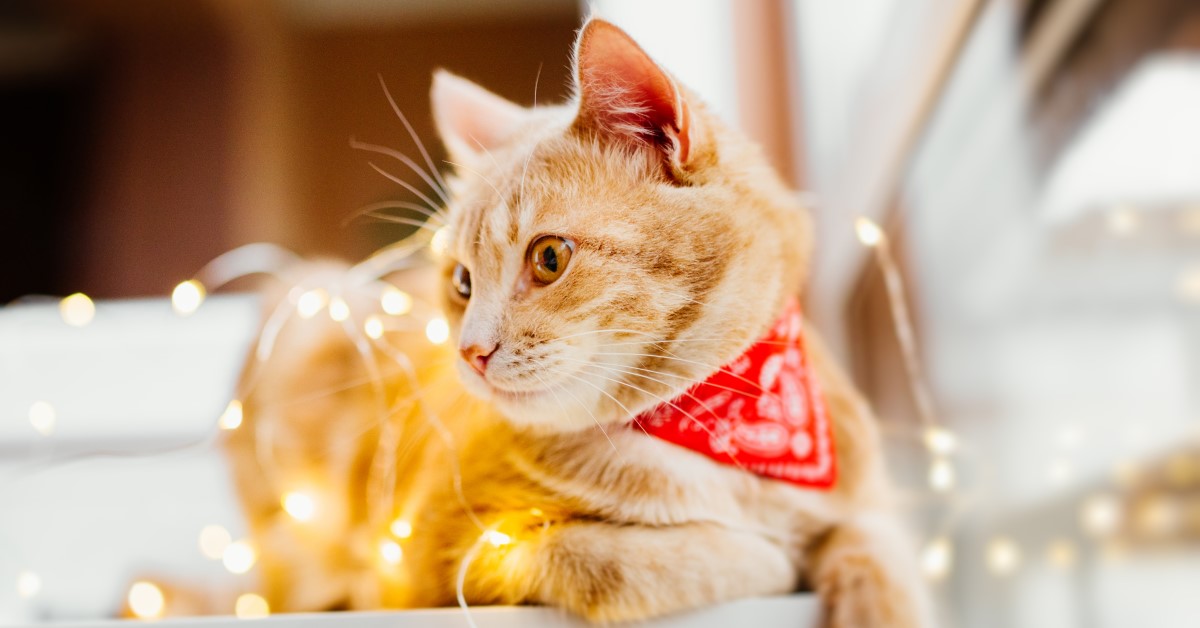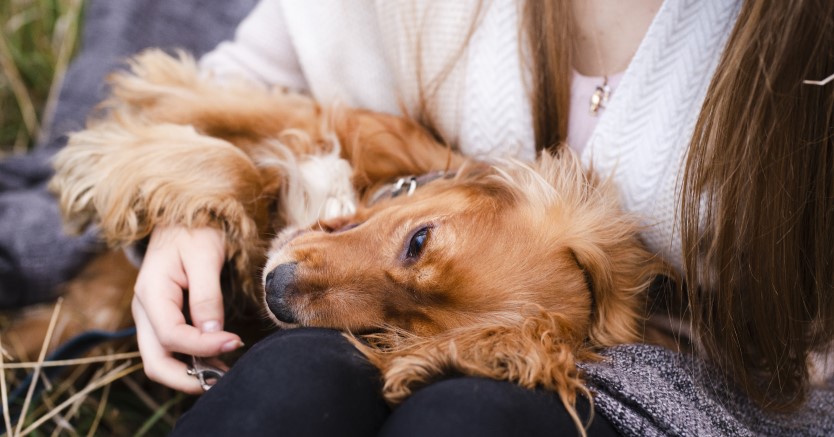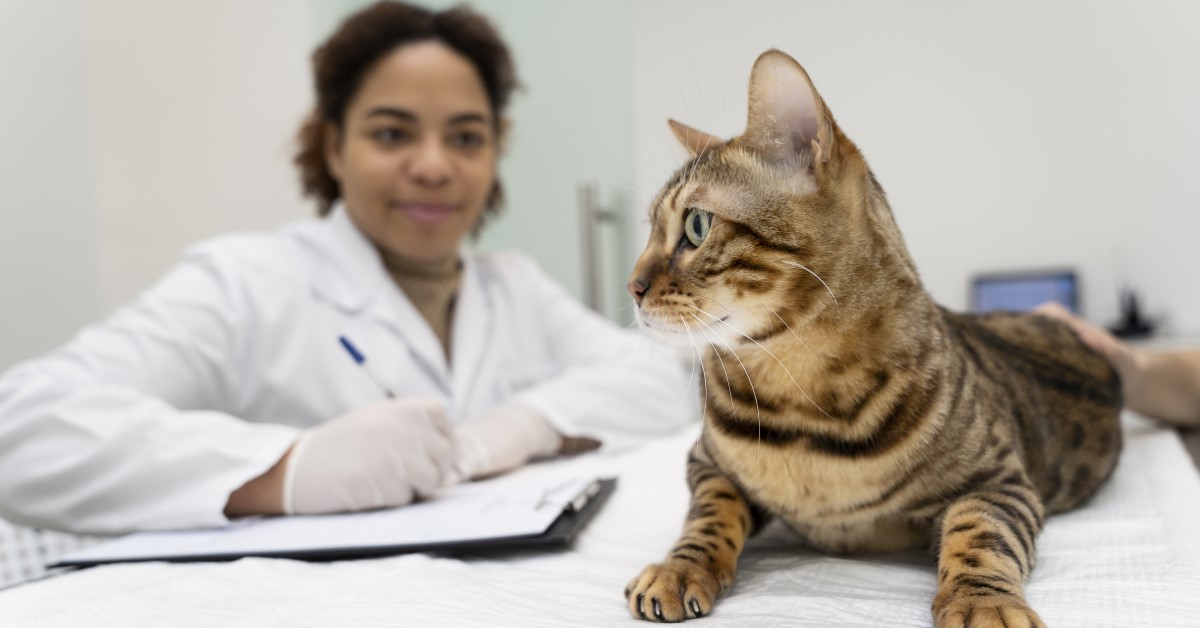Holiday Decorations – 5 Reasons They’re Dangerous for Your Pets
Keep your pets safe this holiday season by pet-proofing your home for Christmas.

Sparkling lights, garland, and ornaments are staples at Christmas time. However, it’s important to remember that some holiday decorations pose safety risks for your pets. Before decking your halls with boughs of holly, learn why certain decorations are dangerous in pet-friendly homes and how to keep your house safe for the holidays.
1. Fresh Christmas Trees Can Cause Illness and Injury
Christmas trees are a beautiful addition to any home during the holidays. Real trees, in particular, are beloved by families that prefer the fresh pine scent and enjoy helping the environment. Although you don’t have to give up your fresh Christmas tree, follow a few safety measures in pet-friendly homes.
Many Christmas trees are adorned with twinkling lights and shiny ornaments that catch the eye of curious pets. Keep wires and extension cords where pets can’t chew on them. The safest lights for holiday decorations are LED battery-operated lights.
Stagnant tree water may contain fertilizers that could harm your pet if ingested. It is also a breeding ground for bacteria. Continue to monitor the water levels of your tree and do not allow water to stand. Finally, watch out for pine needles that may fall off the tree. If your pet ingests these needles, it may cause GI upset and potentially intestinal damage.
2. Pets Can Overindulge in Holiday Goodies
During the holiday season, it’s common for families to have platters of holiday food, cookie displays, or bowls of wrapped or unwrapped candies. From gingerbread houses to homemade chocolates, these sweets can be a delicious treat for humans but harmful to pets.
Some holiday foods are off-limits to pets, such as garlic, onions, raisins, grapes, cooked bones, and chocolate. Even a small amount of these foods can have catastrophic results like kidney failure, intestinal blockages, and heart failure.
However, pets can enjoy some holiday goodies in small quantities, such as white meat turkey, bananas, apples, carrots, and pumpkin puree (not pumpkin pie filling). Limit the number of table scraps you give your pet and ask your guests not to share their food with the cat or dog. Even non-toxic human foods can cause ailments like upset stomach, diarrhea, and vomiting in pets who ingest too much.
3. Burning Candles Can Cause Burns and a Fire Hazard
Candles add warmth and a powerful ambiance to the room, especially during the holiday season. However, they also pose safety risks for excitable pets who may get too close or accidentally knock them over. Your pet could suffer burns simply by walking too close. If a candle is knocked over, it could result in a devastating house fire.
It’s also important to consider scent when purchasing candles for the home. Some candle scents can be overpowering and create a respiratory risk in pets with more sensitive airways. This may be evident in dogs who frequently cough, sneeze, or appear uncomfortable when candles are lit.
One of the best alternatives to real candles are LED candles. These candles provide a realistic look with their flickering lights. If you do decide to display real candles, consider placing them safely in a vessel where the flame is not exposed, such as a glass jar or cylinder designed to hold candles. Aim to use candles that are marketed to be safe for pets, such as natural soy wax candles.
4. Seasonal Flowers and Plants Can Be Poisonous
This holiday season, you may be tempted to bring home seasonal flowers, or you may even be gifted a potted plant. Many pets show no interest in plants, especially when kept out of reach. However, some young or curious pets may decide to take a nibble, leading to an allergic reaction or severe illness.
There are certain plants to watch out for during the holiday season if you reside in a pet-friendly home. These include poinsettias, holly, mistletoe, lilies, amaryllis, rosemary topiary, and English ivy.
Pets that do ingest these toxic plants may display a wide range of symptoms, such as drooling, vomiting, diarrhea, lethargy, and a lack of coordination or balance. If you believe that your pet has chewed or ingested a seasonal plant, contact your veterinarian immediately and continue to look for symptoms of plant poisoning.
5. Holiday Decorations Can Look Like Toys to Your Pet
Your pet may get excited as you decorate the house with round ornaments that look like balls or artificial snow that reminds them of the real thing. Use caution and supervision when decorating with items that your pet may find fascinating. Many traditional ornaments are fragile and could easily become broken with a swipe of a tail or nudge of a nose. Consider switching to shatter-proof ornaments that will not leave sharp shards on the floor.
Avoid the use of edible decorations, such as dough ornaments or popcorn garland. Spray-on snow is also considered toxic for pets and should be avoided. When decorating your home, try to keep your pet distracted with a favorite toy or chew. It may also be a good idea to have your pet stay in a separate room while you’re decorating.
One of the biggest culprits during the holiday season is tinsel. Cats are naturally drawn to tinsel and enjoy chewing on these types of items. However, tinsel can become caught in your pet’s airways, leading to a health emergency. Avoid decorating with tinsel or use it in an area where your pet is unlikely to gain access.
Avoid Pet Hazards for a Safe Holiday Season
While many decorations could pose a safety concern for households with pets, taking a few precautions can help create a safe home for the holidays.
Ready to start saving money on pet wellness care?
Then take a look at Mint Wellness, the pet wellness plan that provides fast reimbursement on routine pet care. Save on vaccinations, wellness exams, preventatives, dental, and more!
Learn More


